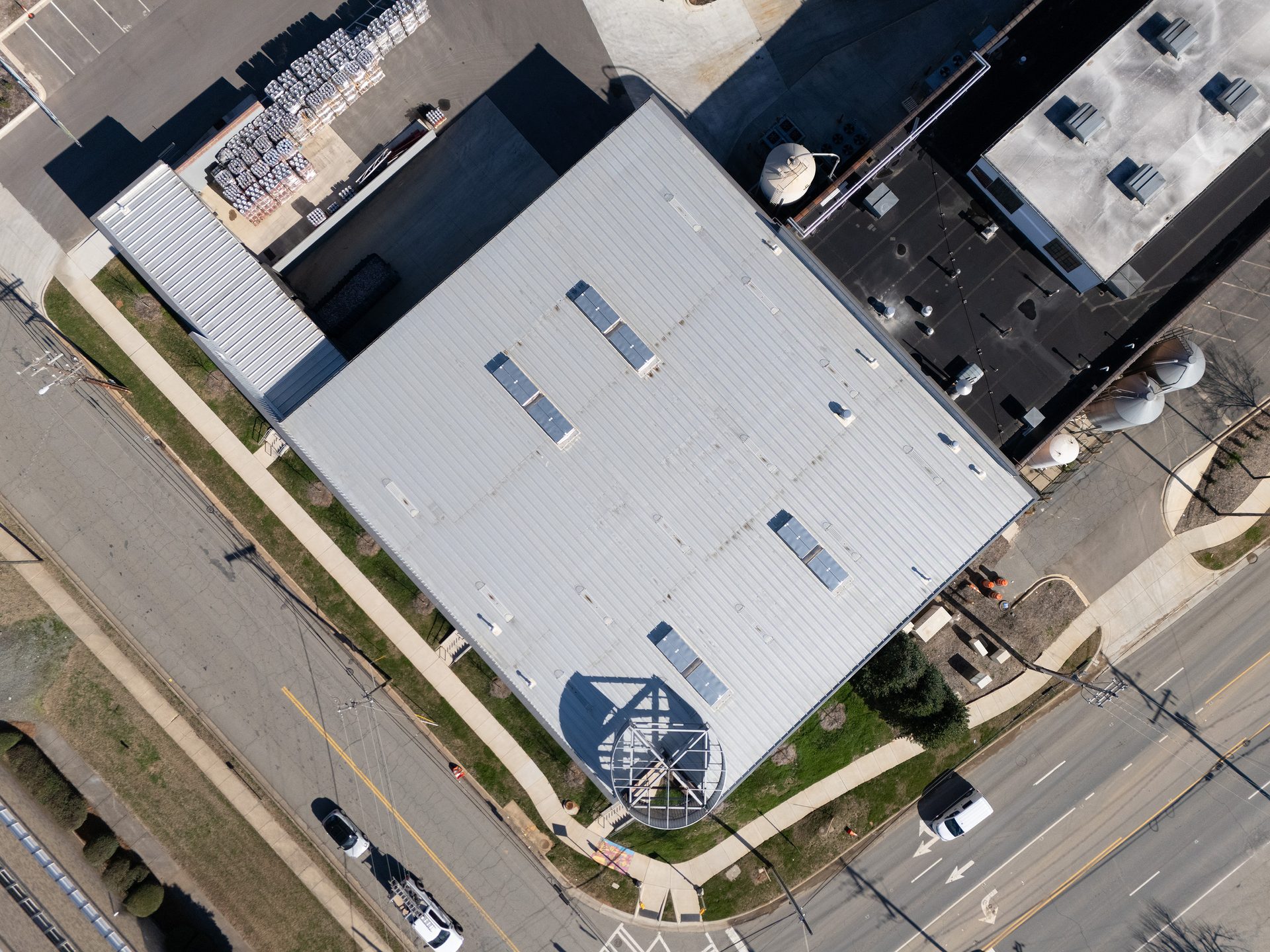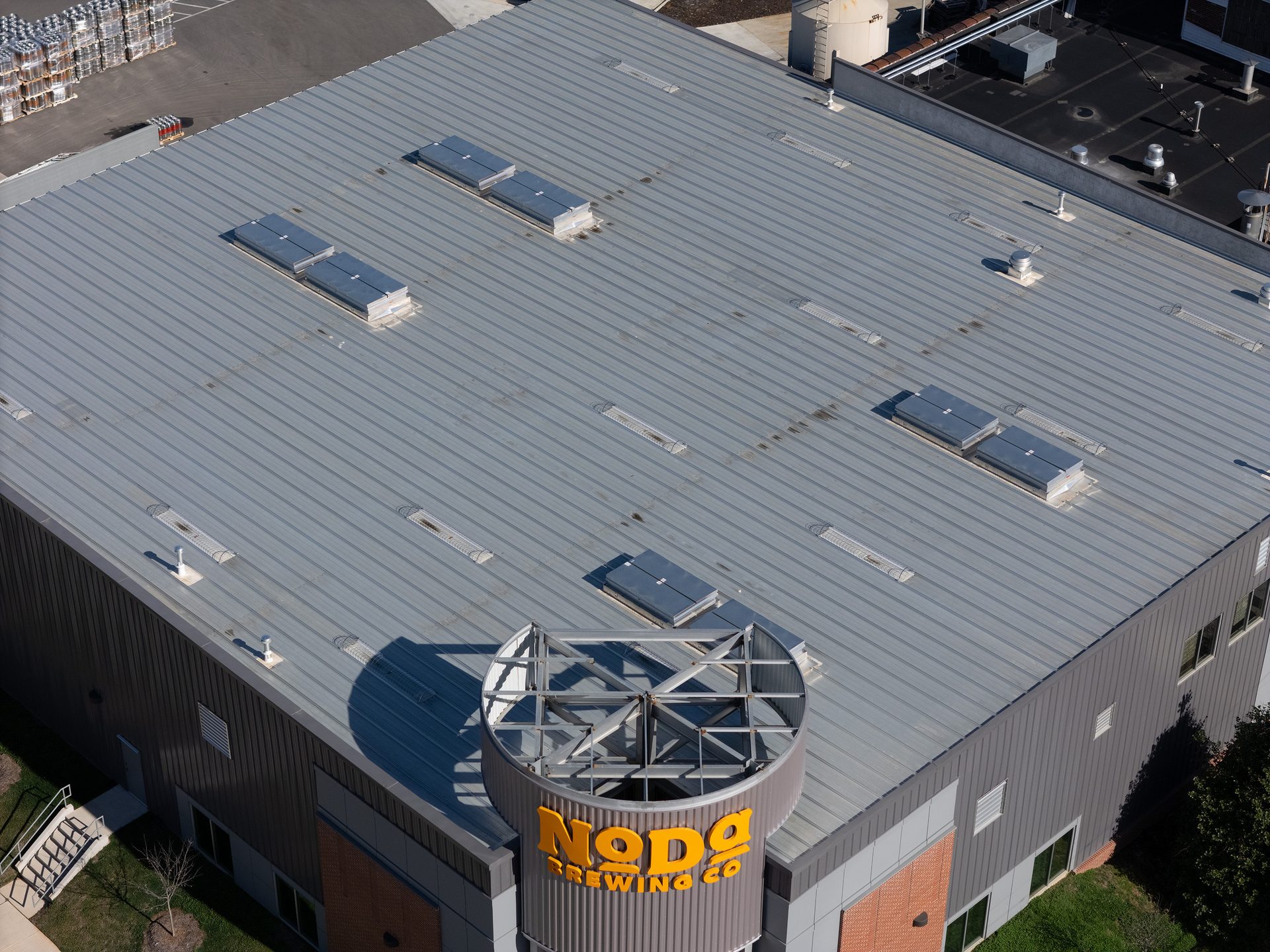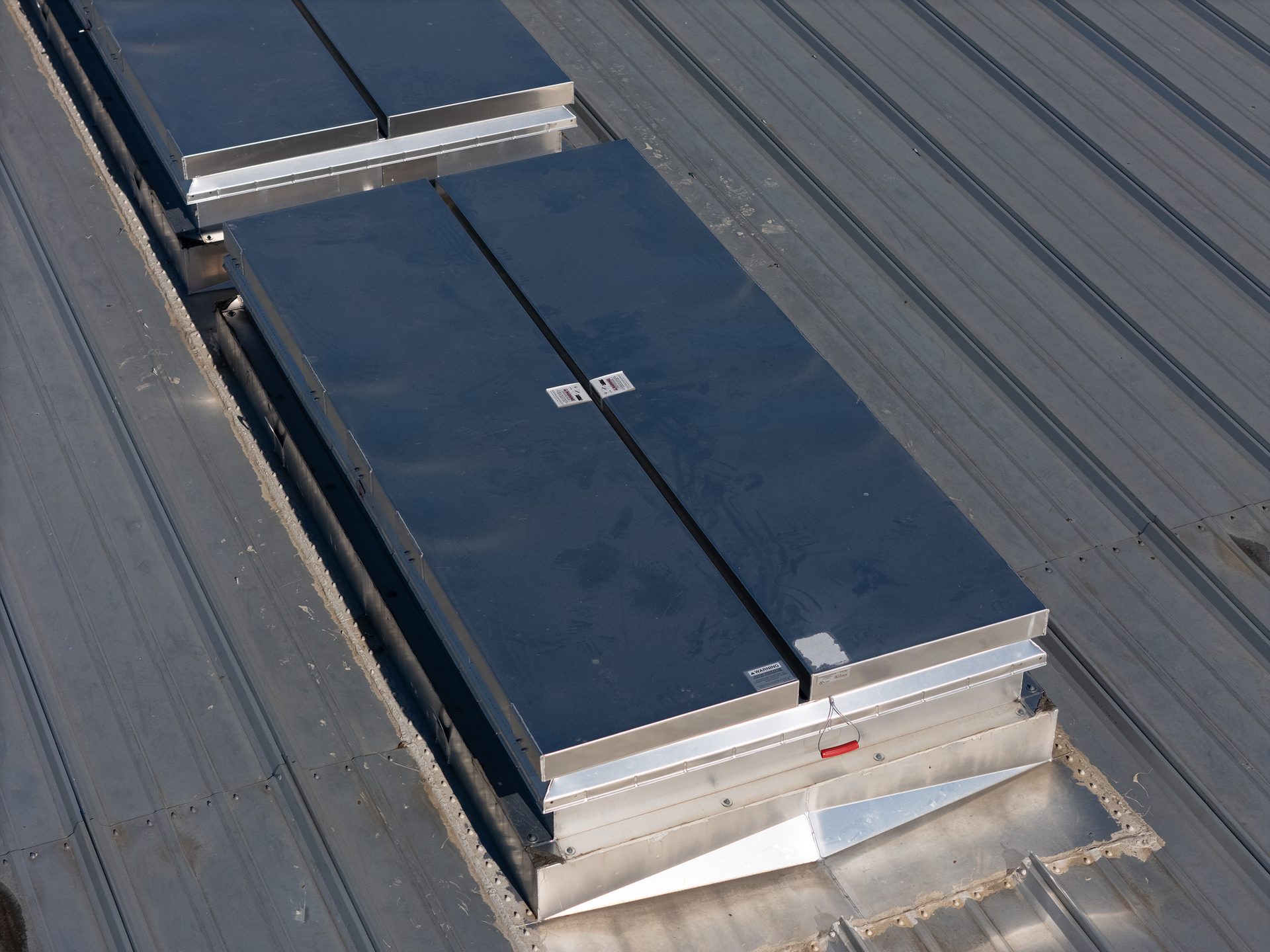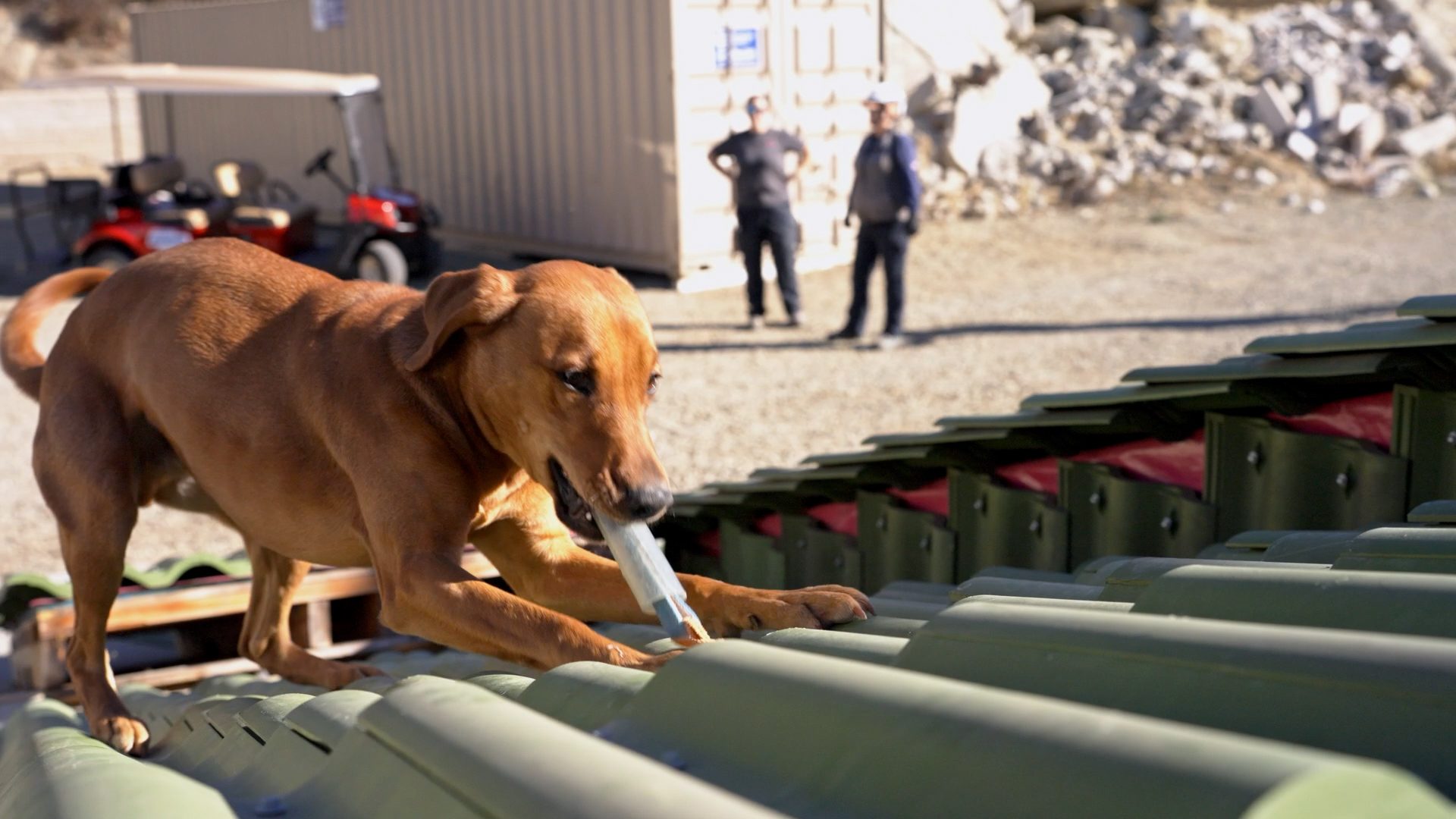PROJECT
PROFILE
Photo credit: Thomas Kemp
NoDa Brewing in North Carolina prioritized fire safety when expanding its facilities by installing smoke vents on its roof.
Trouble Brewing No More
Smoke Vents Help Charlotte Brewery Reduce Risk in Bold Expansion Project
By Thomas Renner
When it comes to fire hazards, breweries are a risky business. Last year, numerous fires erupted in locations throughout the United States. In Michigan, a blaze at Grand Rapids Brewing Company damaged its kitchen and HVAC system and forced the business — which was founded in 1893 and was the oldest operating brewery in the city — to shutter its doors.
NoDa Brewing in Charlotte, N.C., completed a $4 million, 16,000-square-foot expansion of its facility that will increase its production by as much as 40% to about 24,000 barrels per year. Among the critical components included in the expansion were smoke vents that will help protect the property in the event of a blaze.
The expansion project took nearly 2.5 years to complete and will allow the brewery to increase its volume by as much as 40% and increase its current footprint by 50%.
Craft brewing is a competitive business, and NoDa realized expansion was necessary. But brewing beer poses inherent fire risks, and the proper building materials can help prevent and reduce significant property loss.

Cummings Construction, the project’s general contractor, selected Roof Curb Systems as the specialty supplier on the roofing project.
Brewery Fires
The fire that drove Grand Rapids Brewing out of business is not uncommon. While the severity of that fire might have exceeded that of other businesses, fires also occurred last year in many other communities. A neighboring brewery to NoDa in Charlotte saw its business closed for nearly eight months after a two-alarm fire caused nearly $1 million in damage.
The beer-making process poses significant fire hazards. For starters, breweries must store and handle large quantities of grains, which are stored in silos and moved with conveyors and elevators. Storing, transporting and milling of the grains — the process that initiates what ends up in your favorite mug — are all potential fire hazards. A dust explosion can occur when grain, dust, oxygen, an ignition source and a confined space are present.
“When it comes to the grain handling industry, grain fire and grain explosions are the number one cause of injury, death and property damage,’’ according to Alliant, a commercial retail insurance brokerage firm.
Fires can also start due to rupturing ammonia cylinders or piping ruptures, boiling over of pitch vessels, ruptured steam lines and exploding steam vessels, or overheating malt during drying operations. While it seems incongruous, fire and beer go together like, well, beer and pizza.
“The reality is that every brewery faces fire risk every single day of the year,’’ Richard Beall, principal of Beall Brewer Insurance, said on his company website. “There’s hot machinery, power tools, gas-powered vehicles and gas-fed flames, and loads of packaging material and paperwork.
“Think about it. Any craft brewery has plenty of fodder for an accidental craft brewery fire.”

The BILCO vents are activated by the melting of a fusible link and are an economical way to add fire venting in large areas.
Mitigating Fire Risk
For the NoDa Brewing project, Roof Curb Systems (RCS) provided eight smoke vents from BILCO to help reduce the risk of damage from a potential fire.
Working with architects from Childrey Robinson Associates, the team at Georgia-based RCS assisted Cummings Construction of Charlotte to integrate the BILCO smoke vents on the already installed 13,260 square-foot standing seam roof. The vents – four measuring 5 feet by 8 feet and four measuring 5 feet by 10 feet – are a key component in a fire protection plan. Automatic smoke vents assist firefighting efforts and promote safe building evacuation by removing smoke, heat and toxic flames from a burning building.
Smoke vents are ideally suited for large expanses of unobstructed space such as factories, warehouses, auditoriums and retail facilities. They are activated upon the melting of a fusible link and are the most economical way to add fire venting in large areas. Preliminary design plans for NoDa Brewing included sprinkler activation, but fire protection officials mandated that the design include the smoke vents.
Roof Curb Systems supplies specialty curb systems required for the weather-tight construction of a standing seam roof. The mechanically seamed construction roof system from Chief Buildings included at NoDa Brewery are trapezoidal profile panels. The roof panels feature an airtight field seamed high rib connection for weather tightness.
“The BILCO selection was our choice,’’ said Clifton Reasor, RCS’ vice president of business development. “The metal covering in the non-daylighting style was preferred for this project. We trust them and pay a little bit of a premium because we know it’s going to be a quality product. They’re also going to service the product, and that was an important consideration.”
Establishing the weather-tight curb with the BILCO smoke vents was critical to the project and is a specialty of RCS.
“On this particular project, one of the most important aspects was the coordination of materials and installation to ensure that the products integrate correctly,’’ Reasor said. “This was a single skin metal roof project. Our systems are specifically designed to accommodate metal building fundamentals, and most importantly, the weather tightness warranty of the roof system by Chief Buildings. We come into the mix to put all this together and make sure that it’s going to perform for the long term to exceed customer and owner expectations.”
Cummings Construction, the project’s general contractor, selected RCS as the specialty supplier on the roofing project, while Compton Sales distributed the BILCO smoke vents.

The vents – four measured 5 feet by 8 feet and four measured 5 feet by 10 feet, contribute to fire safety by removing smoke, heat and toxic flames.
Thirsty Customers
NoDa’s expansion will help it remain ahead of competitors in the Charlotte local brewery space. The community has more than 40 breweries, all competing to satisfy the taste buds of North Carolina’s largest city. The city is the cultural, economic and transportation hub of the region, and has been one of the nation’s fastest-growing communities over the past two decades.
Last year, NoDa went through a brand refresh in a strategic move to attract younger consumers and newcomers to craft beer while still appealing to its core customers. The expansion project is another step toward meeting the demands of an expanding marketplace.
“In 2023, we grew almost 25% in volume of beer sold,’’ said Jacob Virgil, director of strategic development in announcing the refresh. “We plan to continue growing in 2024 and beyond, and this space will allow us to do that so we can better serve our customers across the Carolinas.”
WHAT: NoDa Brewing
WHERE: Charlotte, N.C.
WHY?: NoDa Brewing recently completed a $4 million, 16,000-square-foot expansion that required smoke vents on its mechanically-attached, 13,260 square-foot standing seam roof to comply with fire safety standards.
KEY PRODUCTS USED: Roof Curb Systems provided eight smoke vents from BILCO to help reduce the risk of damage from a potential fire. The vents — four measured 5 feet by 8 feet, and four measured 5 feet by 10 feet — are a key component in a fire protection plan as they automatically remove smoke, heat and toxic flames from a burning building.
DID YOU KNOW?: The expansion project will increase the brewery’s production by as much as 40%, to a capacity of about 24,000 barrels per year.
Smoke vents are ideal for large, unobstructed space such as factories, warehouses, auditoriums and retail facilities. Preliminary design plans for NoDa Brewing included sprinkler activation, but fire protection officials mandated smoke vents.
To learn more about the awards program or ARMA, visit asphaltroofing.org.
Thomas Renner writes on building, engineering and other trade industry topics for publications throughout the United States.

